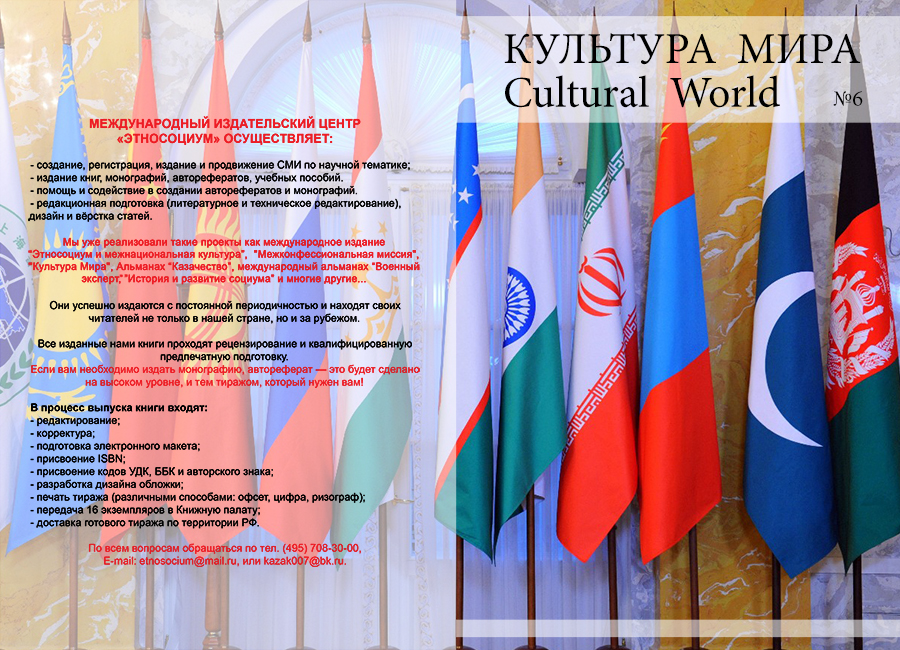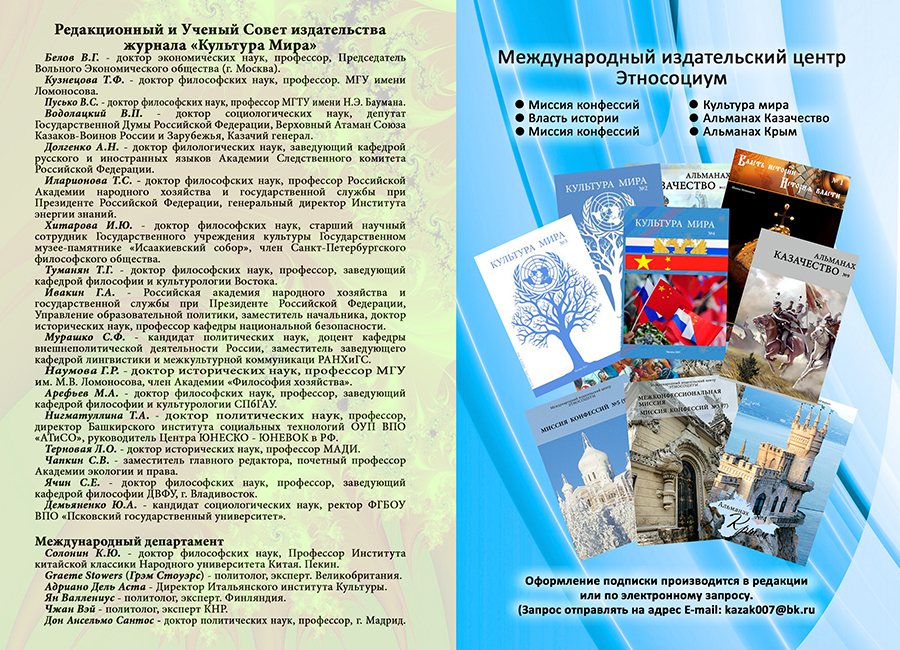
Cultural World №6
Ryabova E.L., Chief Editor, Doctor of Political Sciences, Professor.
The Council of Reviewers of the publishing house together with the teaching staff of leading universities:
The main criteria of our choosing materials for publishing is their high scientific level. The main principle of the publishing house is to accept pluralism of views if authors present their points of view in a well-argued manner. The author’s view point does not have to coincide with the editors’ view points.
The authors of submitted materials are responsible for the accuracy of facts, quotations, dates, events, geographical and proper names.
If you use any materials from the journal, you are to give a relevant reference to it.
All the submitted materials are reviewed.
Journal's Editorial Board
Belov V.G., Doctor of economic sciences, Professor, Chairman of the Free Economic Society (Moscow).
Kuznecova T.F., Doctor of Philosophical Sciences, Professor of Lomonosov Moscow State University.
Pusko V.S., Doctor of Philosophical Sciences, Professor of the Bauman Moscow State Technical University.
Vodolackiy V.P., Doctor of Social Sciences, Deputy of the State Duma of the Russian Federation, Supreme Ataman of the Union of Cossacks of Russia and abroad Warriors, Cossack General.
Dolgenko A N., Doctor of Philology, Head of the Department of the Russian and Foreign Languages of the Academy of the Investigative Committee of the Russian Federation.
Ilarionova T.S., Doctor of Philosophical Sciences, Professor of The Russian Presidential Academy of National Economy and Public Administration, General Director of the Institute of energy of knowledge.
Hitarova I.U., Doctor of Philosophical Sciences, senior researcher, employee of the State institution of culture the Museum Complex The State Museum St Isaac’s Cathedral, a member of Saint-Petersburg philosophical society.
Tumanyan T.G., Doctor of Philosophical Sciences, Professor, Head of Department of Oriental Philosophy and Cultural Studies.
Ivakin G.A., The Russian Presidential Academy of National Economy and Public Administration, management of educational policy, Deputy Head, Doctor of Historical Sciences, Professor of the Department of National Security.
Murashko S.F., Candidate of political sciences, Associate Professor of Russia's foreign policy, Deputy Head of the Department of Linguistics and Intercultural Communication of the Russian Presidential Academy of National Economy and Public Administration.
Naumova G.R., Doctor of historical sciences, Professor of the Lomonosov Moscow State University, Member of the Academy "Philosophy of Economy".
Arefev M.A., Doctor of Philosophical Sciences, Professor, Head of Department of Philosophy and Cultural Studies.
Nigmatullina T.A., Professor, Director of the Bashkir Institute of Social Technologies PMO VPO of the Academy of Labor and Social Relations, Head of UNESCO Centre in Russia.
Ternovaya L.O., Doctor of historical Sciences, Professor of the Moscow Automobile and Road Construction University.
Chapkin S.V., Deputy Chief Editor, Honorary Professor of the Academy of Ecology and Law.
Yachin S.E., Doctor of philosophical sciences, Professor, Head of the Department of Philosophy FEFU, (Vladivostok).
Demyanenko Y.A., Candidate of sociological sciences, Rector of VPO Pskov State University.
International Department
Solonin K.Y., Doctor of Philosophy, Professor of the Institute of Chinese classics, Chinese People’s University. Beijing.
Graeme Stowers, political expert (United Kingdom).
Adriano Del Asta, Director of the Italian Cultural Institute.
Yan Vallenius, political expert. (Finland).
Chjan Vei, political scientist, expert of China.
Don Anselmo Santos, Doctor of Political Sciences, Professor, Madrid.
Contents
|
Human Rights
|
|
|
Kalinina K.V. Rights and freedoms of the indigenous peoples of the North, Siberia and the Far East: theoretical and methodological background
|
4
|
|
Galaganova S.G. Proteus of world decay: Konstantin Leontiev on nationalism and national cultures
|
14
|
|
Hainickaya E.A. The reflection of Orthodox culture in the women’s monastic tradition of Amur River Region
|
22
|
|
International relations
|
|
|
Gilina L.V. Advertising as a Neologism-oriented discourse: a Study of Advertising English and German Languages
|
30
|
|
Ahmedova Sevinj Osman gyzy The concept of “family” in lexical-semantic and phraseological systems of the English and Azerbaijan languages
|
36
|
|
Chjan Vei The peculiarity of SCO and its information components
|
45
|
|
Philosophy of Culture
|
|
|
Ternovaya L.O. Political messages of the monuments dedicated to students
|
66
|
|
Abstracts
|
77
|
|
Authors
|
80
|
Abstracts
Galaganova S.G.
Proteus of World Decay: Konstantin Leontiev on Nationalism and National Cultures
The article is dedicated to the image of Proteus in the general sense in the creative works of K. Leontiev, Russian philosopher and scholar. The author argues that K. Leontiev’s ideas, formerly subtle and provocative, tend to become inspiring and especially interesting in the 21th century.
In the paper, the author states that always existing nationalist movements and attitudes, grounded on ethnic cleavages, are described in Leontiev’s works as fundamentally interlocked with standardization of culture. The author concludes that nationalists’ movements and ideas, a fight for the so-called national identity always leads to creating an averaged, homogenized culture, thus burying peculiar national cultures. It is concluded that the world’s money ideology tends to replace traditional values. There is no such a thing as “healthy” nationalism. To prove this point, the author gives a number of historical, political and cultural examples in the article.
Keywords: Konstantin Leontiev, culture, national culture, nationalism, ethnos, ethnic nationalism, cosmopolitism, capitalism, Money Civilization, National Idea.
Hainickaya E.A.
The Reflection of Orthodox Culture in the Women’s Monastic Tradition of Amur River Region
This article is dedicated to the modern tradition of monasticism with Amur Region convents as an example. The article outlines the main stages of the history of convents and their lifestyle features, the main functions and mission of convents. Moreover, the author speaks on three stages of Orthodox monasticism, their differences and details. As a conclusion, the author denotes the main problems, which the convents of the region face nowadays on their way of formation.
The article is recommended to all specialists of theology, culture studies, history and those who are studying the Amur River Region in these aspects.
Keywords: the traditions of the Orthodox Culture, degree of monkhood, Amur region, Bogorodichno-Albazinsky St. Nicholas Monastery, Tyndensky Pokrovsky convents, Petropavloskiy convents in Khabarovsk Territory, Diocesan convents of St. Innocent, Metropolitan of Moscow in the JAR.
Gilina L.V.
Advertising as a Neologism-oriented discourse: a Study of Advertising English and German Languages
The article is dedicated to the study of neologisms in advertising in English and German discourse. The primary aim of the research was to single out the main tendencies of the use of neologisms in modern authentic English and German advertisements; to find out common features and distinctions between them. The typical features of the advertising discourse on different levels were studied using the examples taken from English and German advertising. With the help of the classification suggested by John Algeo the most productive patterns of coining new words were singled out. In advertising English those are compounding, affixation, abbreviations and clippings; while German copywriters rely on affixation and borrowings. For that purpose more than twenty English and ten German printed magazines of different types were analyzed, including women-oriented magazines. It goes without saying that the results of the research contribute to the formation of cultural awareness of not only students but also linguists and may be used in teaching English and German in the classroom of intermediate and advanced learners of the language.
Keywords: advertise, advertisement, neology, neologism, discourse, linguistics, the English language, the German language, modern world, mass media, global, language and culture, commercial, technological revolution, compounding, affixation, abbreviation, clipping, productive patterns, neology-prone spheres, cultural artifacts, language levels (syntactic, stylistic, lexical, grammatical and phonetic), advertising discourse.
Ahmedova Sevinj Osman gyzy
The concept of “family” in lexical-semantic
and phraseological systems of the English and Azerbaijan languages
The article deals with the English and Azerbaijan languages. The verbalization of the concept of “family” in the lexical-semantic and phraseological systems of the English language is in the centre of the author’s attention. The semantic structure of the word family, set phrases, idioms as well as proverbs with the word are analyzed. The analysis reveals the essential features of the concept of “family” in the native English speaker’s consciousness. Lexical-semantic, phraseological and paremiological material involved in the study revealed such features as “reticence”, “parents”, “children”, “relaxation”, “space”, “love”, “ access to outsider”, “genetics”, “consent /coexist,” “spot/ flaw”, “lack of choice / predetermination”, “poverty = a lot of children.”
Keywords: concept, notion, family, linguistic picture of the world, mentality, considerable sign.
Ternovaya L.O.
Political Messages of the Monuments Dedicated to Students
In the article, the author pays special attention to the notion of “monument-symbol” as an object that does not fall into any category of monuments. It is highlighted that the value of a monument may be different and not understandable for everyone, especially when a monument gives an estimation not to a concrete person but to the abstract, the collective.
In recent decades, the nomenclature of monuments has been enlarged by a number of objects, which reflect different professions. A special category of such monuments is monuments dedicated to students. In this paper, the author argues that despite the fact that such monuments cannot be considered masterpieces of arts, they have a profound political and social meaning.
The author draws several points of conclusion. First, we can estimate and evaluate the politics of memory by estimating the politics towards monuments in the society. Second, we can trace a tendency of depersonalization in the art of monument in general. Third, while more attention is paid to the world of subjects, the images of people are less and less reflected in the art of monuments.
Keywords: monumental propaganda, politics of memory, monuments-symbols, students.
Authors
Ahmedova Sevinj Osman gyzy, Teacher of Azerbaijan State Pedagogical University (Baku city, Azerbaijan).
Chjan Vei, Graduate student of Journalism faculty of the Moscow State University.
Galaganova S.G., Candidate of Philosophic Sciences, Senior Lecturer (Reader) the Bauman Moscow State Technical University, Department of Political Studies.
Gilina L.V., Graduate student of the Department of Psychology of Moscow Academy of Finance and Law, Teacher at School of Foreign Languages / English Language Department for Economic and Mathematical Disciplines at National Research University of Higher School of Economics.
Hainickaya E.A., Graduate student of the FGBOU VPO “Sholom -Aleichem Priamursky State University”, Assistant Department of History and Archival.
Kalinina K.V., Institute of the Faculty of Social Sciences Russian Presidential Academy of National Economy and Public Administration.
Ternovaya L.O., Doctor of Historical Sciences, Professor (MADI The Moscow Automobile and Road Construction University).


